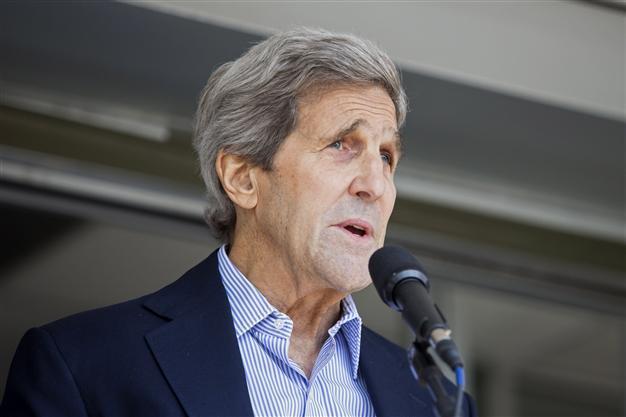Kerry: Accounting of past Iran nuclear work not key for deal
WASHINGTON - The Associated Press

AFP Photo
U.S. Secretary of State John Kerry said June 16 that a full accounting of Iran's possible past atomic weapons research is not necessarily critical to reaching a nuclear deal with Tehran.Kerry said the U.S. and its negotiating partners are "not fixated" on the issue of so-called "possible military dimensions" because they already have a complete picture of Iran's past activities. He said they are more concerned that those activities have stopped and about what Iran might do in the future. Negotiators are concentrating their efforts on that as they race to meet a June 30 deadline to reach a deal, Kerry said.
"What we're concerned about is going forward," Kery told reporters at the State Department by video link from his home in Boston, where he is recovering from surgery on a broken leg.
After reaching an interim accord with Iran in November 2013, the Obama administration said a comprehensive solution "would include resolution of questions concerning the possible military dimension of Iran's nuclear program."
But officials told The Associated Press last week that those questions won't be answered by the June 30 deadline. Instead, they said, the U.S. and its partners are working on a list of future commitments that Iran must fulfill to resolve the concerns about past work.
Much of Iran's alleged work on warheads, delivery systems and detonators predates 2003, when Iran's nuclear activity first came to light. But Western intelligence agencies say they don't know the extent of Iran's activities or if Iran persisted in covert efforts. An International Atomic Energy Agency investigation has been foiled for more than a decade by Iranian refusals to allow monitors to visit suspicious sites or interview individuals allegedly involved in secret weapons development.
Iran denies any work on or interest in nuclear weapons, insisting that its enrichment of uranium, plans for a heavy water reactor and various research activities are meant for power generation and other peaceful applications. It says pieces of evidence cited by the IAEA and others are forgeries, and officials including Iran's Supreme Leader Ayatollah Ali Khamenei have made several defiant statements about blocking monitors from accessing Iranian facilities and scientists.
Critics of the emerging Iran deal have focused significantly on the issue of Iran's past military work. They insist Iran must not only "come clean" on such activity for transparency's sake, as past and present U.S. administrations have long demanded, but that compliance with any accord can only be measured if Tehran provides a complete accounting of all its previous nuclear efforts. Critics contend that otherwise, the world wouldn't have a full script of everything it needs to verify.
On June 16, the chairman of the Senate Foreign Relations Committee, Sen. Bob Corker, expressed concern about reports of concessions, particularly regarding Iran's accounting of its weaponization activities. Corker described that as yet another "redline" that would be crossed.
"I again urge the administration not to be afraid to walk away if Iran insists on crossing remaining redlines that are essential to a verifiable agreement," he said.
















